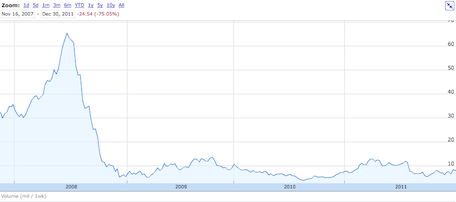Reuters’s reporting on Oklahoma natural gas giant Chesapeake Energy was some of the best corporate journalism of last year.
Its digging resulted in Chesapeake CEO Aubrey McClendon being stripped of his chairman duties and any bonus for 2012 and triggered state and federal investigations into the company’s anticompetitive activities.
Tom Ward, who founded Chesapeake with McClendon, went off on his own in 2006 with a company called SandRidge Energy, and as Reuters says, with the news writer’s understatement, “adopted some of the same idiosyncratic business practices deployed by McClendon.”
Those practices include an option on every well the company drilled, sketchy self dealing, conflicts of interest that include personal loans from companies doing business with SandRidge, and extravagant compensation beyond the ripoff standards of present CEO culture. Ward’s pay is even more egregious than McClendon’s, which is saying something since the Chesapeake CEO got his board of cronies to give him a $75 million bonus and pay him $12 million for his map collection while the company shares cratered in 2008.
SandRidge paid Ward $116 million from 2007 to 2011, and he netted another $19 million from selling his well shares back to the company, according to Reuters. That’s an obscene amount of money under any circumstances, but particularly for running a company with a market cap of just $3.3 billion (or roughly $5 billion if you include all its ancillary trusts). Here’s what the company’s shares did during that time:

That $19 million profit came when SandRidge bought Ward’s share of its wells for $67 million at the height of the financial crisis in 2008:
The payout to the CEO came at a time when SandRidge was itself in financial distress. By the end of 2008, the company had just $636,000 in cash on hand, according to the company’s annual report.
That’s a company being run almost entirely for its CEO, and damn the other shareholders.
Unlike Reuters’s Chesapeake probes, which seemingly benefited from some high-level mole, this story appears to be based on publicly available information waiting to be pieced together. It’s another very good investigation.
Ryan Chittum is a former Wall Street Journal reporter, and deputy editor of The Audit, CJR’s business section. If you see notable business journalism, give him a heads-up at rc2538@columbia.edu. Follow him on Twitter at @ryanchittum.
